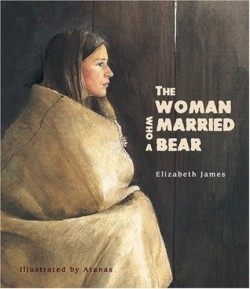It looks like you've stumbled upon a page meant to be read by our code instead of viewed directly. You're probably looking for this page.
The Woman Who Married a Bear
“Bears! Ugly, filthy bears!” a girl shouts when she steps in bear dung while picking blackberries. Her reaction toward bears changes, however, in this retold folktale of the indigenous people of western Canada and Alaska.
When the girl’s blackberries spill, she stays behind, telling her friends, “I’m not leaving these for the greedy bears to eat.” A man wearing a bear pelt takes her to his village, which consists of Bear People who change between human and bear form. After saying, “You found the one who insults us,” the Chief gives the man permission to marry the girl instead of punishing her. Surprised that her bear husband is considerate, the girl, later designated as “the woman,” thinks about the forced marriage: “He may seem kind, but truly he is selfish.”
Watercolor paintings, many with text superimposed, depict beautiful scenery, such as an illustration showing three teenage, berry-picking girls in a grassy meadow containing colorful flowers. One girl’s dress has American Indian artwork on the back, including a rectangular blue face.
Atanas’ first picture book was The Lost Island. Bulgarian galleries in Sofia, Sevlievo, and Nova Zagora have displayed his work. Private collections also contain his art. James, a writer and translator residing in Vancouver, B.C., retold The Little Black Hen and translated The Queen Bee; both are picture books.
Children ages seven to twelve will learn about American Indians’ respect for animals from this skillful presentation of the girl’s gradual attitude change, including the discovery that she loves her semi-bear children. The background-information page increases understanding of the story. For example, folktales about marriage between humans and animals are common.
When children feel annoyed with animals, remembering the Bear People may help them notice their fellow creatures’ good qualities.
Disclosure: This article is not an endorsement, but a review. The publisher of this book provided free copies of the book to have their book reviewed by a professional reviewer. No fee was paid by the publisher for this review. Foreword Reviews only recommends books that we love. Foreword Magazine, Inc. is disclosing this in accordance with the Federal Trade Commission’s 16 CFR, Part 255.
